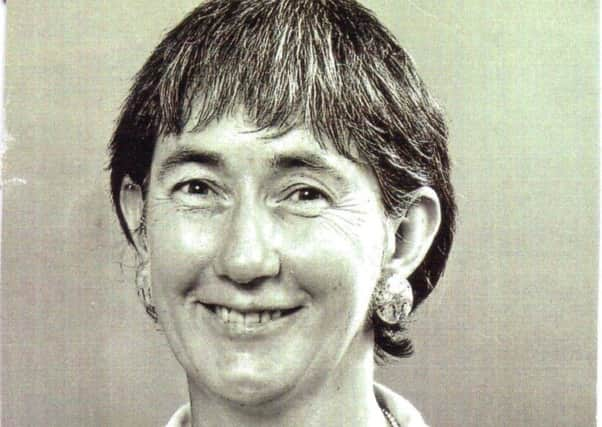Obituary: Elizabeth Templeton, theologian


Elizabeth Templeton, who has died at the age of 69, was one of the most creative and imaginative of Scottish theologians. She wrote of Jesus’s resurrection: “In the community of those who had learned to love Jesus, the presence of this man who had died and gone became more clear and potent and continuing that it had been even in his lifetime,” but she continued significantly: “In the language of pictures and evocation, of symbols and myth”.
So in the theological spectrum she belonged to the radical wing, though her commitment to the Church was both clear and significant.
Advertisement
Hide AdAdvertisement
Hide AdPartly through circumstances, and partly through her suspicion of institutions, she did not have a long or permanent academic career, but she won affectionate respect and great admiration at home and abroad as a theologian of distinction and insight.
Mrs Templeton’s family lived on the Glasgow/Paisley border. Her father’s deep Christian faith led him into pacifism which in turn resulted in his being imprisoned three times in Barlinnie during the Second World War.
For a brief period at Hutchesons’ Girls School she was a member of the Scripture Union, but she was dissatisfied with what she felt was its concern for “the right words”. Her minister, who had a considerable influence on her, and to whom she dedicated her first book, introduced her to the mystics and gave her, she said, “a sense of the largeness of the mystery of God”.
At Glasgow University Elizabeth Templeton originally intended to study classics and English but switched to English and Philosophy, where she felt strongly the pressure of the agnosticism of two of her tutors, and encountered the scepticism of AJ Ayer, whose writing raised in her mind questions of intellectual integrity.
Keith Ward, who later became Professor of Theology at the University of London but then taught in Glasgow, said that Elizabeth Templeton was the brightest student he ever taught.
In her student days in Glasgow, she wanted faith to be true but could not convince herself, though she continued to go to church. She wanted to test how those who believed met the challenges to faith of which she was only too well aware.
So she decided to study theology and enrolled at New College in Edinburgh where she made the discovery that faith is not individual but communal and so she could remain within the community of faith while still living with fundamental questions about it.
At the time a Greek theologian, John Zizioulas, taught at New College. He had been appointed, it was said, in the expectation that he would be a supporter of ecumenical orthodoxy but was in fact a most radical thinker.
Advertisement
Hide AdAdvertisement
Hide AdHe had the most profound effect on Elizabeth, who responded positively to his ecumenical outlook and radical theology. “And,” she liked to say, “for John doctrine was less important than human joy and human freedom.”
After graduating in theology, Elizabeth embarked on ten years of theological teaching in Edinburgh, then left to start a drop-in centre in Edinburgh’s Methodist Central Hall for discussion and debate in an attempt to help counteract what she regarded as an inveterate clerical tendency to withhold current theological explorations and reasonably assured biblical criticism from congregations, thus disempowering so many.
In the 1960s she was the secretary of the General Assembly’s so-called Committee of Forty, set up to make recommendations for the reshaping of the Church for the last quarter of the 20th century. Along with the Committee’s convener, Professor Robin Barbour, the two made a formidable combination. They had the satisfaction of seeing their radical proposals for the reform of the Church approved, and the disappointment of later watching the Church’s establishment gradually repeal or nullify them.
In 1994 Elizabeth Templeton chaired a working party of the Kirk’s Panel on Doctrine on the theology of marriage, which took a very sympathetic view of homosexuals. She persuaded the General Assembly to accept it.
Elizabeth Templeton was an extremely effective religious broadcaster, not only presenting the sort of radio programmes which introduced listeners to contemporary, radical theology, but also making regular and memorable contributions to Thought for the Day on BBC Radio Scotland and Radio 4.
She produced the basic material for study by the Anglican Churches’ Lambeth Conference in 1990, for the World Council of Churches Faith and Order Conference in Santiago de Compostella in 1993 and at various times for the Bishops’ Conferences of the United States, Canada and Australia.
Rev Professor David Fergusson of Edinburgh University said: “Elizabeth was a great loss to the academy when she left in the late 70s to raise her young family, yet her subsequent work as a freelance theologian enabled her to reach a wider ecumenical audience and so contribute to her vision of a theologically literate laity.”
She is survived by her husband Douglas, a theologian who also taught at New College, their daughter Kirsten, son Calum, and her brother Peter Maclaren. The body of their other son, Alan, was found at the foot of Salisbury Crags in 2012, six years after he had disappeared.
Johnston McKay